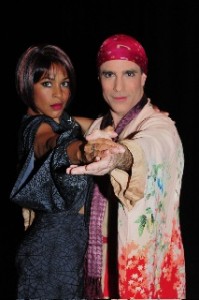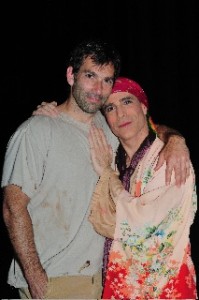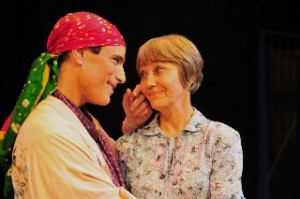
When the folks at Musical Theatre Guild were planning their 2008-2009 season of rarely performed Broadway musicals, it probably didn’t occur to anyone that their one-night-only revival of Kiss Of The Spider Woman would come only months after L.A.’s first fully staged production of Kiss since Chita Rivera and the National Tour played at the Ahmanson in 1996. Havok’s production (which featured many MTG performers, and which many felt surpassed the Tour in excellence) would indeed be a hard act to follow. There was no way a “concert staged reading” could match Havok’s design elements or the complexity of the many production numbers which recently won Lee Martino the LADCC Award for Best Choreography. MTG’s readings are, after all, presented with minimal sets and lighting, and few if any costume changes, and the entire show is allowed only 25 hours rehearsal time per Actor’s Equity rules. On the other hand, what MTG could and did offer Monday’s audience at Glendale’s Alex Theatre was a whole bunch of superb performances, and a chance to go back to the basics of Terrence McNally’s book, John Kander’s music, and Fred Ebb’s lyrics. The result, I’m happy to say, was an absolute triumph.
MTG Artist Joshua Finkel appeared in the original Broadway cast from its very first preview on April 19, 1993, exactly sixteen years and one day before MTG’s opening-closing night. Since Finkel covered the role of Molina (which won Brent Carver the Tony and William Hurt the Oscar in the non-musical film of Manuel Puig’s novel), a better choice could not have been made for MTG’s Molina. Finkel’s work on Monday night can only be described as virtuoso, the kind of multi-layered, deeply moving, virtually flawless performance one usually sees after months of rehearsals and performances. Disappearing entirely into Molina’s gaunt, flamboyant, tormented, proud, humiliated, defiant skin, Finkel acted and sang the hell out of the role, getting every possible laugh from Molina’s fabulousness and every possible tear from his poignancy.
It certainly helped that Finkel was performing opposite Robert Mammana as Valentin. In fact, it’s harder to imagine a more perfect complement to Finkel’s Molina. Tough, tall, macho, yet with an intelligence, appetite for learning, and compassion awakened by his contact with Molina, Mammana’s performance was powerful, touching, and beautifully sung–and his chemistry with Finkel was palpable.
Jennifer Shelton is one of MTG’s secret weapons, a gorgeous and multitalented performer who could easily be starring on Broadway–and proved a stunning Aurora to boot. Though MTG’s Aurora was asked to do less dancing than Broadway’s Chita, what Shelton did was very good indeed, and any reduction of Aurora-as-dancer was more than made up for by Shelton’s rich, vibrant, powerful voice and electric stage presence.
Director Randy Brenner brought out the best of his three stars’ talents, adding many memorable touches of his own. I particularly liked how Molina’s mother and Valentin’s girlfriend were right there in their jail cell whenever the two prisoners got to reminiscing, or when Molina’s mother sat next to him on his hospital bed for “You Could Never Shame Me.”
With Equity allowing only 25 hours to stage and rehearse songs, dialog, and dances, choreographer Jane Lanier apparently made the wise decision to cut some of the early prisoners’ dance numbers, the better to concentrate on production numbers from Aurora’s movies. Even without them, this was the danciest MTG show since No, No, Nanette over three years ago, and an extremely well-danced one at that. Ensemble members Hector Guerrero, Todd Hunter (of the Spider Woman national tour), Marc C. Reis, and Ray Rochelle were simply amazing in “Where You Are,” especially considering that they learned this and several other numbers in a weekend. Lanier’s inventive choreography had Guerrero and Reis backing up Shelton, with a perfectly-synched Hunter and Reis doing identical moves with Finkel as he recalled a scene from one of Aurora’s movies. That Finkel’s dance partners were also his jailers was particularly effective. Lanier staged “Morphine Tango” as a ballet, and a stunning one. The Act One finale proved the evening’s biggest showstopper, with the four chief dancers joined by Michael Kostroff, Brandon Michael Perkins, Jeffrey Christopher Todd, and Paul Wong for a doozy of a number which ended the act to audience cheers and whoops.
Forty-nine years after her Broadway debut as the original Kim MacAfee in Bye Bye Birdie, Susan Watson still knows how to wow an audience, as she did in her tear-provoking rendition of Molina’s mother’s “You Could Never Shame Me.” Linda Igarashi did lovely work as Valentin’s well-to-do girlfriend Marta in “Dear One,” sung in exquisite four-part harmony with Mammana, Finkel, and Watson.
Kostroff proved that he can play sinister as well as “Max Bialystock zany” in the role of the jailer. Hunter and Rochelle were suitably rough and scary as prison guards. As Gabriel, the “over the wall” object of Molina’s unrequited love, Perkins showed off a gorgeous voice in “Gabriel’s Letter,” and played his later scene opposite Finkel with great sensitivity. Hunter gets snaps for transitioning from rough jailer to a brief, amusing scene as Molina’s flamboyant coworker, and Todd had a nice turn as an ineffectual Amnesty International volunteer.
Under the musical direction of keyboardist/conductor Darryl Archibald, the impeccable eight-piece orchestra sounded like twice that many. Shon LeBlanc and his Valentino’s Costumes had Shelton looking smashing in white (as Aurora) and black (as the Spider Woman), and the rest of the cast looking appropriately bedraggled. John W. Calder, III, Art Brickman, Ricarda McKissock, and Danielle See deserve a round of applause for keeping everything running smoothly backstage.
The only thing about this Spider Woman that left me a bit ambivalent was the decision for the entire cast (with the exception of the possibly American Aurora) to perform it with Spanish accents. While the accents may have given more of a Latin American feeling to the show, and perhaps added to the charm of Finkel’s performance, other productions have done just fine without “acentos,” and there was considerable variation among the cast, from subtle shadings to not so subtle, and in one case, no audible accent at all. I’m still on the fence about this.
I’m absolutely not on the fence about declaring that these virtuoso performers, whether MTG Artists (Finkel, Igarishi, Kostroff, Shelton, and Watson) or Guest Artists (the remaining eight cast members), are consummate professionals whose talents (and abilities as “fast studies”) place them at the top of their profession. Broadway’s Encores may have the more widespread reputation, but I can’t imagine those New Yorkers doing it any better than L.A.’s illustrious MTG. To paraphrase Carly Simon, “Nobody does it better. (MTG) you’re the best.”
Musical Theatre Guild, The Alex Theatre, 216 N. Brand Ave., Glendale.
www.musicaltheatreguild.com
–Steven Stanley
April 20, 2009





 Since 2007, Steven Stanley's StageSceneLA.com has spotlighted the best in Southern California theater via reviews, interviews, and its annual StageSceneLA Scenies.
Since 2007, Steven Stanley's StageSceneLA.com has spotlighted the best in Southern California theater via reviews, interviews, and its annual StageSceneLA Scenies.







 COPYRIGHT 2025 STEVEN STANLEY :: DESIGN BY
COPYRIGHT 2025 STEVEN STANLEY :: DESIGN BY